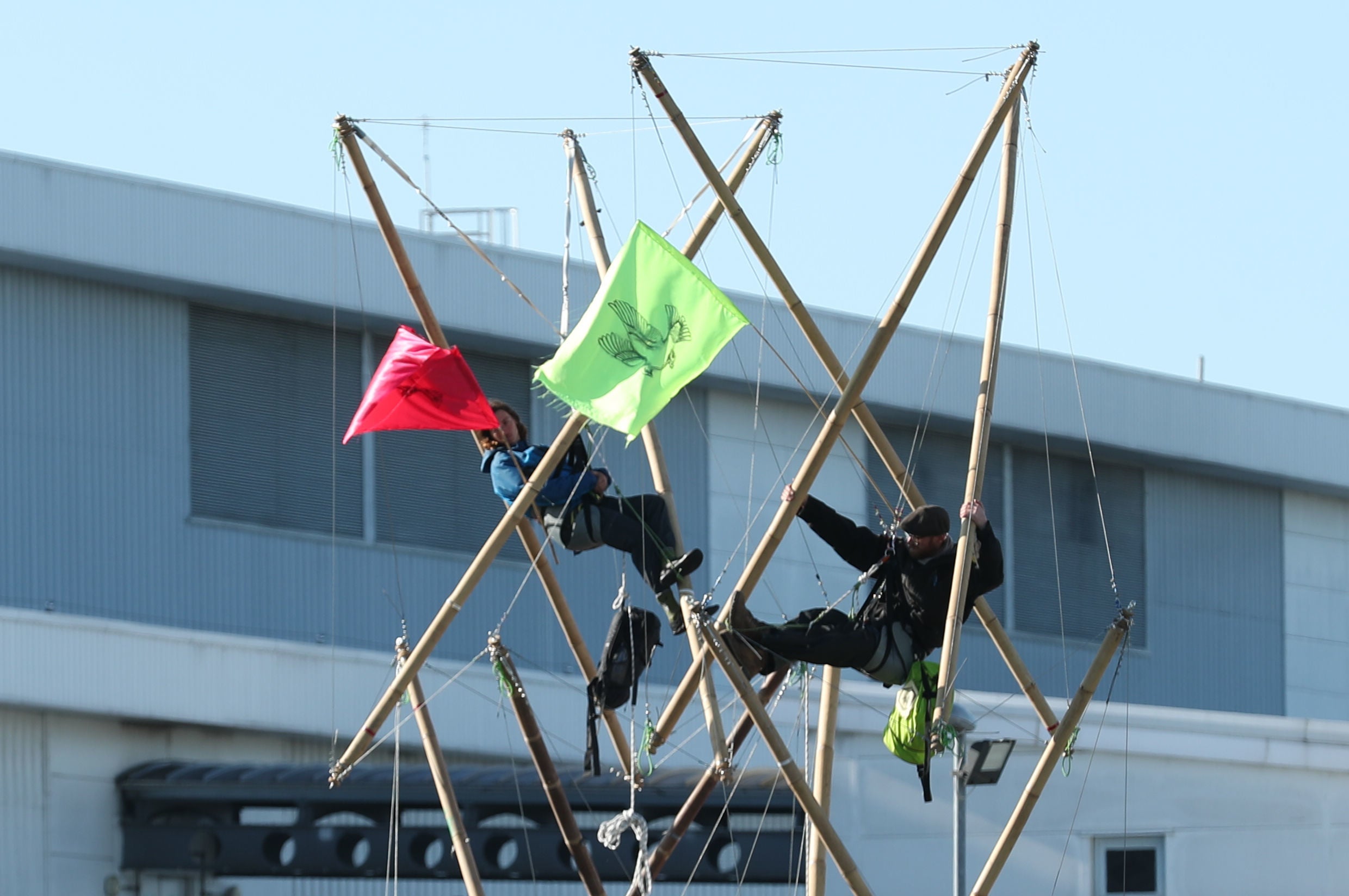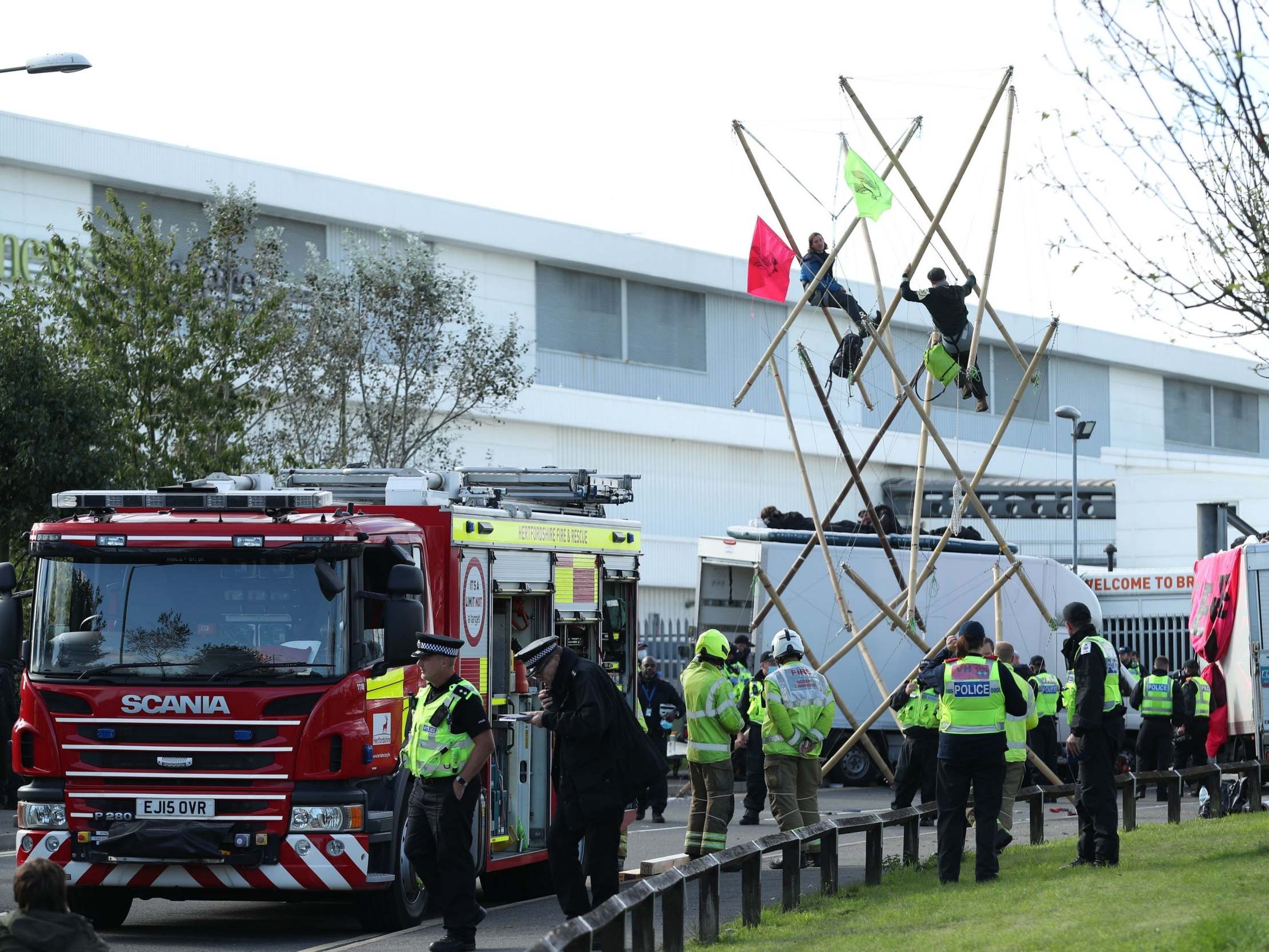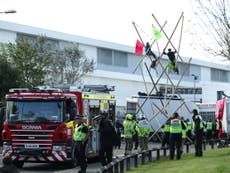Priti Patel may have influenced police response to XR blockade of printing press, court hears
Police recorded multiple phone calls between home secretary and chief constable during operation to remove protesters, court told
The home secretary may have influenced the police response to an Extinction Rebellion protest at a Rupert Murdoch-owned printing works, a court has heard.
A trial at St Albans Magistrates’ Court has been told of multiple calls from “the home secretary” to the chief constable of Hertfordshire Police during the blockade in September.
The defence argues that such interference would contradict the fundamental principle of operational independence for police in the UK, which the government has previously committed to protecting.
Priti Patel publicly condemned the demonstration at the time, calling it an “attack on our free press” and “completely unacceptable”, and dozens of activists have since been prosecuted.
The government is now backing a controversial suite of strengthened protest laws that are a direct response to Extinction Rebellion’s tactics.
A judge ruled that records of contact between the Home Office and police over the printworks protest must be shared with the court on Monday.
District Judge Sally Fudge said documents that she had seen contained “references that are directly relevant to the question of government intervention” and must be disclosed to defence lawyers.
“The issue in this case has always been the manner of state intervention in the protest and whether it was proportionate in all the circumstances,” she told the court.
“Particular focus has been placed within this application [for disclosure] on the involvement of government ministers, in particular the home secretary, in any decisions taken on how the protest should be dealt with.”
Police documents previously described to the court contained four entries referring to “the home secretary” calling the chief constable of Hertfordshire Police.
The first entry was around one and a half hours after the protest started on 4 September, and said that the home secretary and prime minister were aware and “taking an interest”, the court heard.
Further calls were noted shortly before and shortly after midnight, and police recorded that the home secretary wanted protesters to be removed quickly.

In the early hours of the morning, an entry said the chief constable had called the gold commander for the policing operations asking if removals could be sped up, and saying he had received multiple calls from the home secretary throughout the night.
The specialist protest removal team responded to say that they could not carry out their work any faster, the court heard.
Police officers who have given evidence to the court say that their decisions were not influenced, but defence lawyers have launched a preliminary abuse of process application.
District Judge Fudge said the new material could “reasonably be considered capable of undermining the prosecution case” against the six protesters currently on trial.
She highlighted several email chains involving Home Office officials, but the contents were not read to the court.
A further hearing will take place on Friday, where the judge will make a final ruling on what material must be shared with parties in the case.
District Judge Fudge said she was “not pleased at the time this disclosure exercise is taking”, and was “surprised” that the material in question was not shown to the defence or prosecution before the trial.
Earlier in the hearing on Monday, prosecutor Nigel Ogborne said the Crown Prosecution Service (CPS) had asked for “clarification from the Home Office with regard to any notes which were made by any of the parties involved and civil servants”.
Addressing the court before the judge’s ruling on Monday, defence barrister Raj Chada said the issue was whether there had been “interference by the state” in the policing operation, including over the removal, arrest or prosecution of protesters.

The evidence emerged during the trial of the second group of defendants who have been charged with obstructing a highway at the Broxbourne protest.
Caspar Hughes, 49, of Exeter, Elise Yarde, 32, of Walthamstow, Amir Jones, 39, of London, Laura Frandsen, 30, of London, Charlotte Kirin, 51, of Bury St Edmunds and Hazel Steson, 56, of Bury St Edmonds, deny all charges.
The first group of six demonstrators were convicted in May and two others pleaded guilty before trial.
The court heard that a log kept by the police operation’s gold commander was not initially disclosed to either the prosecution or defence.
Its existence was revealed following questioning of police witnesses over who was responsible for making decisions on the removal and arrest of demonstrators.
The blockade was at the Newsprinters site in Broxbourne, Hertfordshire, which is owned by Mr Murdoch’s News UK.
About 50 protestors used vans and bamboo structures outside the gates to the plant where The Sun, The Times, the Daily Mail, the Daily Telegraph and the Evening Standard were printed.
They stopped three and half million national newspapers from being distributed across the country.
A second blockade of the company’s printing works in Knowsley, near Liverpool, took place on the same day.
Protesters previously told St Albans Magistrates’ Court the action aimed to highlight the media’s failure to report the seriousness of climate change.




